Những Khái Niệm Căn Bản Giúp Hiểu Hơn Về Đạo Trung Dung Của Nho Gia – Một Triết Lý Sống Dẫn Đến Cùng Đích Nhân Sinh
Basic Concepts for Better Understanding Confucian Doctrine of the Mean – A Philosophy of Life Leading to the Ultimate Human Purpose.
DOI:
https://doi.org/10.54855/csl.244311Từ khóa:
Đối Thoại Liên Tôn, Chăm Sóc Ngôi Nhà Chung, Tình Bằng Hữu, Giáo HộiTóm tắt
Tu thân và truy cầu cái Thiện là đích nhắm của triết lý Trung Hoa. Do đó, triết lý Trung Hoa quan tâm đến cách thức làm thế nào để sống hạnh phúc và sống tốt vượt trên mối quan tâm về phương pháp luận. Đồng thời, những tư tưởng của Đông phương thường được diễn tả bằng những châm ngôn, ẩn ngữ và ngụ ngôn ngắn gọn, nhưng lại rất sâu sắc và đụng chạm mạnh đến con người. Một trong những bậc thầy lớn ảnh hưởng đến nền triết lý Trung Hoa là Khổng Tử, ông đã ảnh hưởng nhiều đến việc hình thành tư tưởng về đạo Trung Dung, nhằm chỉ ra con đường hướng con người đến cùng đích nhân sinh là sự Thiện Tối Cao. Bài viết này tập trung tìm hiểu các khái niệm Thiên 天, Đạo 道, Nhân 仁, Thành 誠, và Thánh Nhân 聖人, . Những khái niệm dẫu rất căn bản nhưng vô cùng quan trọng để hiểu hơn Trung Dung – con đường dẫn đến sự Thiện.
Abstract
Self-cultivation and the pursuit of Goodness are the goals of Chinese philosophy. Therefore, Chinese philosophy is concerned with how to live happily and live well, transcending concerns about methodology. At the same time, Eastern thoughts are often expressed in brief sayings, aphorisms, and parables, but they are profound and strongly resonate with people. One of the great masters who influenced Chinese philosophy was Confucius, who had a significant impact on the formation of the concept of the Doctrine of the Mean, which points the way for people to reach the ultimate purpose of life – the Supreme Good. This article focuses on exploring the concepts of Heaven (天), the Way (道), Benevolence (仁), Sincerity (誠), and the Sage (聖人). These concepts, although very basic, are incredibly important for better understanding the Doctrine of the Mean – the path leading to Goodness.
Tài liệu tham khảo
Sầm Hiền An & other, Thiên, trans. Nguyễn Duy Hinh (HCM: NXB Khoa học Xã hội, 2003), 19.
Zhang Dainian, Key Concepts in Chinese Philosophy, trans. Edmund Ryden (USA: Yale
Zhang Dainian, Op.cit., 4
Nguyễn Văn Thọ, Con đường huyền nhiệm Trung Dung, bài thuyết trình tại CQPTGL. https://nhantu.net/TonGiao/ConduongHuyennhiemTrungdung.htm accessed February 6, 2023.
Cf. Chunqing Li, Zhong and Zhongyong in Confucian Classics, trans. Yuan Zhu (Beijing: Foreign Language Teaching and Research Publishing, 2020), 14.
Lý Minh Tuấn, Tứ Thư Bình Giải, Op.cit., 1245.
“聖人,” từ điển Hán Nôm, accessed January 31, 2023,
https://hvdic.thivien.net/whv/%E8%81%96.
Nguyên văn: 誠 者 天 之 道 也 誠 之 者 人 之 道 也 誠 者 不 勉 而 中 不 思 而 得 從 容 中 道 聖 人 也
David L. Hall and Roger T. Ames, Focusing the Familiar a Translation and Philosophical Interpretation of the Zhongyong (USA: University of Hawai‘i Press, 2001), 24.
Lý Minh Tuấn, Trung Dung thuyết minh (2001), chương XXV.
Tải xuống
Đã Xuất bản
Số
Chuyên mục
Giấy phép
Bản quyền (c) 2024 Trịnh Thái Sơn, S.J.

Tác phẩm này được cấp phép theo Giấy phép quốc tế Creative Commons Attribution-NonCommercial 4.0 .
Authors retain copyright and grant the journal the right of first publication with the work simultaneously licensed under a Creative Commons Attribution 4.0 International License that allows others to share the work with an acknowledgment of the work's authorship and initial publication in this journal.
Authors are able to enter into separate, additional contractual arrangements for the non-exclusive distribution of the journal's published version of the work (e.g., post it to an institutional repository, in a journal or publish it in a book), with an acknowledgment of its initial publication in this journal.













